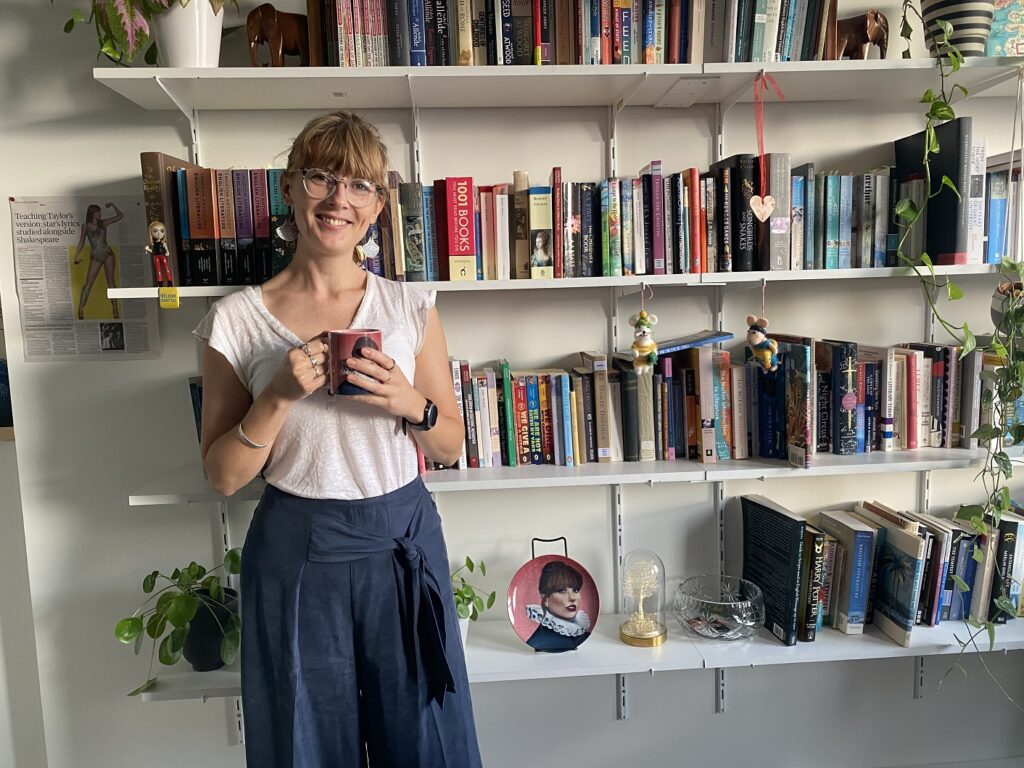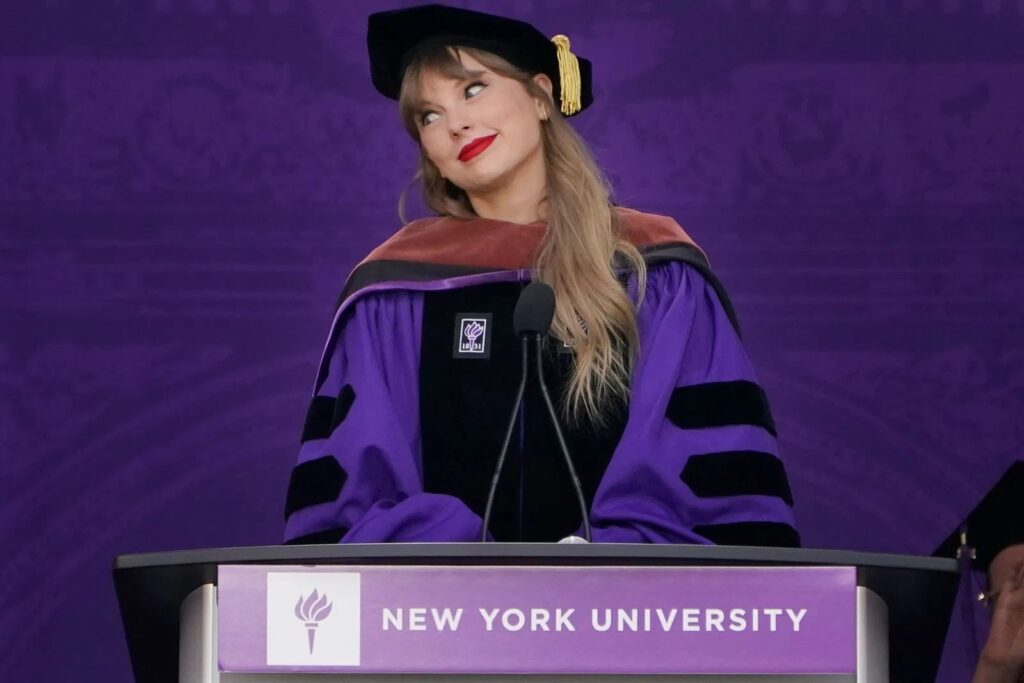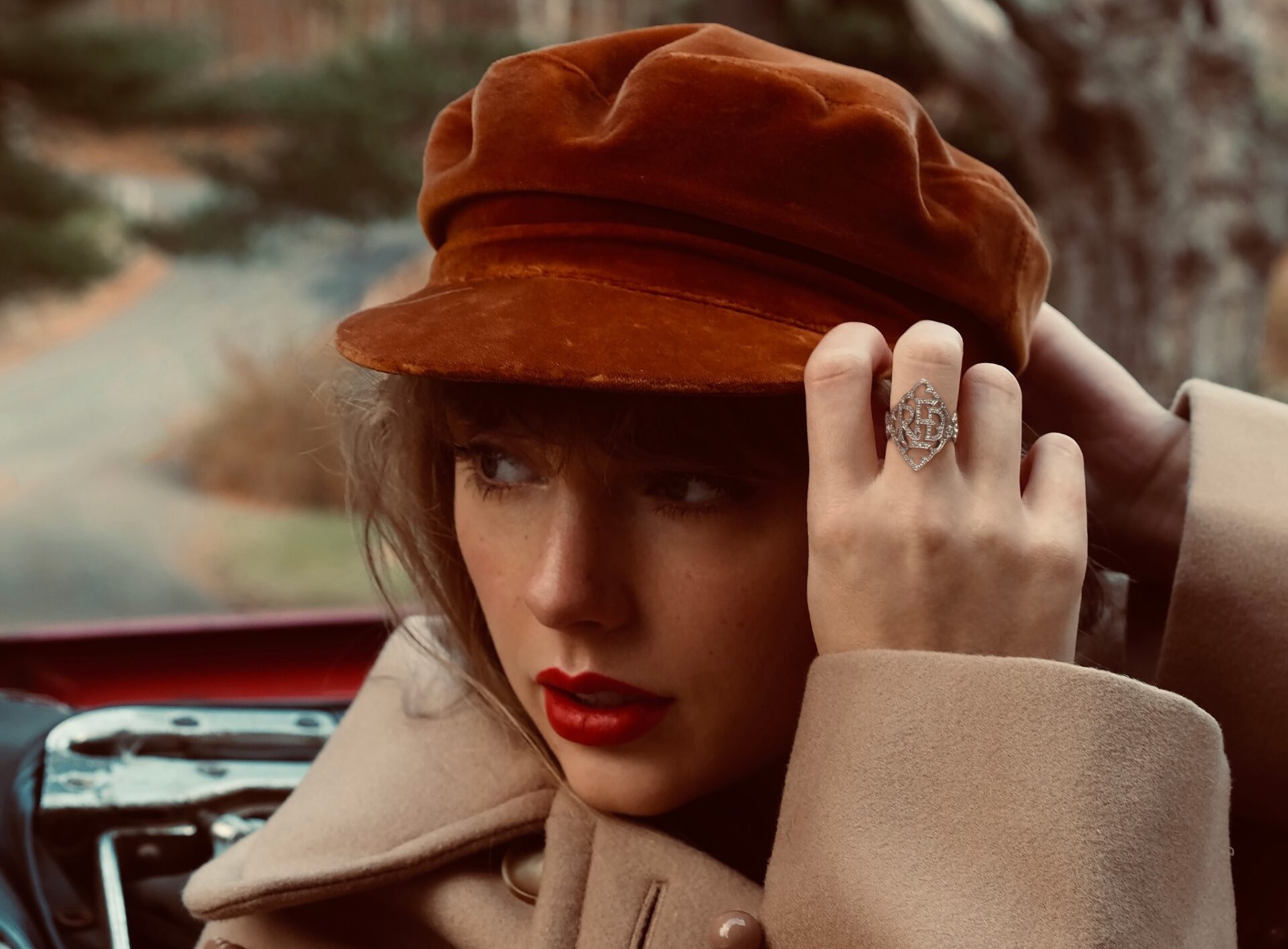“She's always been there, like a backdrop to my life,” Professor Elly McCausland says early one October morning, almost silhouetted in the bright light streaming through the east-facing windows of her office in Ghent University. But she is not speaking about a family member or friend.
As one might expect of a literature professor, the cosy space is stuffed with books and dotted with potted plants. But her shelves have two even more telling objects: a mug and a decorative plate, each depicting the same portrait: a crimson-lipped Taylor Swift in an Elizabethan ruff standing before a rosy background.
McCausland has been a Swiftie since the release of the album Fearless in 2008, but it was only over the last four or five years, that she began mulling over the literary references in her favourite musician’s lyrics. That came after pursuing an academic career that began as a student at Oxford University and eventually brought her to Ghent University as a specialist in children’s literature.
Then came the pandemic. While the lockdown extinguished most people’s creativity, it set other people’s aflame: perhaps the most notable being Taylor Swift herself. Since the second half of 2020, she’s released three albums – folklore, evermore and Midnights – as well as the re-recording of her albums 1989 (Taylor’s Version), Fearless (Taylor’s Version), Speak Now (Taylor's Version) and Red (Taylor’s Version).
She also launched a new world tour, Eras which has been so phenomenal that it has noticeably boosted the local economies of each city that she performs in. The recent documentary, Taylor Swift: The Eras Tour, grossed $200 million at the global box office in the first three weeks of its release in October, a record for a concert movie. At same time, Bloomberg said the 33-year-old, who has sold some 200 million records globally, is now a billionaire. Her impact is such that in September, the newspaper USA Today announced a job posting for a Taylor Swift reporter.
“I'd had this vague idea that there's a lot to be said about Taylor Swift and English literature floating around my head for a while now,” she admits. For a long time, however, it was just a recurring conversation with her other Swiftie friends. But when she moved to Belgium, a fellow colleague who teaches climate change and fiction mentioned that he had mentioned Swift in one of his classes on nature writing. The two began to correspond on this subject, and they certainly weren’t the first.
On her Swifterature blog, McCausland highlights other professionals who took notice of Swift’s literary bend, linking to articles like ‘The Linguistic Evolution of Taylor Swift’ published in the JSTOR Daily in 2020 and ‘20 Taylor Swift songs with literary references you may have missed’ by Insider in 2023. Just four months ago, The Sydney Morning Herald published “Why Taylor Swift is a literary giant – by a Shakespeare professor.”
Magic, madness, heaven, sin
But the truth epiphany came to her while listening to the first bonus track of Swift’s Midnights album, titled The Great War. Two verses, in particular, seem to compare the survival of a difficult relationship to the memorialising of fallen soldiers in World War I: We can plant a memory garden/Say a solemn prayer, place a poppy in my hair.
It triggered her thought process, with conflicting feelings over the appropriateness of comparing heartbreak to the horrors of war. And it matched what she and her students had felt when she’d taught Sylvia Plath’s 1962 poem, Daddy, which uses references to Nazis and fascism to describe her troubled relationship with both her father and her ex-husband: An engine, an engine/Chuffing me off like a Jew/A Jew to Dachau, Auschwitz, Belsen.
And so McCausland found herself asking a similar question about both Swift and Plath’s works. “Is it really acceptable to appropriate the suffering and murder of approximately six million people in order to articulate one’s Daddy issues?” she wrote in a blog post on this subject.
McCausland concluded her post with a potential answer: “Perhaps, in the spirals of a crisis precipitated by grief and loss, it seems only logical to urge the world to wake up to our violent hurt by reaching for the most catastrophic analogy we can muster, even if it does entail the problematic appropriation of historical pain.”
But catastrophic analogies aside, if just two Swift verses had triggered such a deep literary discussion, there was certainly room for more. So when the time came to propose English literature courses for the autumn 2023 semester, McCausland thought, “Let's give it a go, Let’s see if this Taylor Swift thing works.” In the event, she found more than enough material for 10 weeks of classes.

Elly McCausland in her Ghent University office
The course idea was well received, which might be a surprise given the traditional nature of Ghent University, an institution founded in 1817 by King William I of Orange (it boasts links with Nobel Prize winners Joseph Guislain, Walter Fiers, Marc Van Montagu and Peter Piot, while alumni include internet pioneer Robert Cailliau and astronaut Dirk Frimout). Indeed, she was warned that her lectures might be over-attended since Ghent University does not cap the number of students per class. McCausland, however, was unconvinced: she felt that only a handful would be interested.
And so the Literature (Taylor’s Version) course was born, promising to offer “an in-depth look at key themes, topics, genres and techniques from English literature (c.900-1900) via the lens of modern popular music; specifically, the work of Taylor Swift.”
McCaulsand’s nonchalance about the course’s popularity proved mistaken: it succeeded all too well. As of early October, she was lecturing 65 students (double the amount she would usually expect for a Masters course in literature) and counting, since students can register for a course even later in the semester.
Why did this class resound with Belgian students? McCausland says the course could have worked in any modern institution, but perhaps was accepted so enthusiastically at Ghent University because it is different from what the university usually offers. “From the reaction I’ve had from the students, I know they’re really pleased about attending a class that is less traditional and makes connections with their modern world,” she says.
Lost in the memory
This is certainly the case for Shweta Prakash, a 19-year-old Taylor Swift fan and exchange student from Germany. Prakash studies in the business school, but when she heard about Ghent University offering a course on Taylor Swift and English Literature – and what’s more, during the exact semester she would be studying there – she immediately emailed McCausland to ask if she could attend. Prakash was frank in admitting that if it hadn’t been for the Taylor Swift element, she would not have taken a literature class.
Accessibility, according to McCausland, is the entire point. “If I can get students excited by medieval poetry written in (almost) another language because they can trace its connections to Swift’s songs about white horses and knights in shining armour and see how the institution of chivalry has been fraught with anxiety and faultlines even since its very inception and social consolidation, I consider my work well done,” she says.
Although the course has been welcomed by Ghent University’s faculty and students, the idea of making English literature more accessible by comparing it to Swift’s lyrics and persona has ruffled feathers in the wider academic community. McCausland cites sarcastic comments in newspapers, critical posts on social media and even hate mail.

Taylor Swift delivering her New York University commencement address
The problem, according to McCausland, is gatekeeping, a “genre of hate” that claims that Taylor Swift’s music is not worthy of study. But she turned this “genre of hate” into an opportunity for self-reflection, going as far as presenting screenshots of the insulting articles, social media posts and emails during the first lecture of the semester.
“The obvious question is, what literature is worthy of study? It just gives me more material for my course because I want students to reflect critically on what they’re doing,” she explains, “What are we all doing here in this classroom talking about Taylor Swift?”
Though she encourages debate amongst the students, McCausland already has an answer to the latter question. “What this course can do is to provide clear-cut examples of how there's a real thread from historical text through to modern culture,” she adds, listing chivalry, the antihero and unlikeable women as just some of the same themes that appear both in traditional English literature and Swift’s songs. “As a teacher, I’m always keen to stress the matter of importance, like why reading a 14th-century poem is relevant now. It can seem quite alien because it is just from so long ago.”
In other words, studying Taylor Swift’s lyrics alongside ancient English texts shows that down the centuries, humans continue to struggle with the same problems and portray the same feelings. To use McCausland’s terminology, it makes intimidating literature less alien.
Haters gonna hate
McCausland’s main issue is with people who insult the idea without ever engaging in the actual discourse. “What is the canon? What is good literature?” she asks rhetorically. “They don't really have an answer, either.”
She notes how many elite academics seem put off by how popular Taylor Swift is, as if fame is a sign of poor quality. “Is something not worthy of study just because it’s popular? Because it’s new?” she says.
The hate also seems specifically directed towards what young women choose to enjoy. “The feminist in me is curious,” McCausland says. “I don’t think there was the same level of hate directed at, for example, Bob Dylan when he was nominated for the Nobel Prize for literature. If you unpack that, there’s a whole load of elitist assumptions there about gender.”
She also notes that writers now considered canon, such as Shakespeare, created what at the time was considered popular lowbrow media. “And look at how we see them today!” she says.
The point about classes like Literature (Taylor’s Version), McCausland says, is not just to demystify historical literature, but also to provide an opportunity to learn about the present. “It absolutely makes sense to study what is popular because it's popular,” she says. “It can tell us something about the zeitgeist, tell us something about culture, about society. In fact, it makes more sense to study things that most people are actually reading.”

